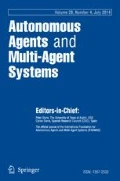Abstract
Recently in the field of agent communication, many authors have adopted the view of interaction as a joint activity regulated by means of dialogue games. It is argued in particular that this approach should increase the flexibility of dialogues by allowing a variety of game compositions. In this research note, we present a framework suited to this feature. A preliminary attempt to capture the negotiation phase (which allows agents to agree upon the dialogue game currently regulating their conversation) is discussed.
Similar content being viewed by others
References
L. Amgoud, N. Maudet, and S. Parsons, “Modelling dialogues using argumentation,” in Proceedings of the 4th International Conference on Multi-Agent Systems (ICMAS00), Berlin: IEEE Press, pp. 31-38, 2000.
H. H. Clark, Using Language, Cambridge University Press, 1996.
M. Dastani, J. Hulstijn, and L. V. der Torre, “Negotiation protocols and dialogue games,” in Proceedings of the 5th International Conference on Autonomous Agents (Agents2001), Montreal, Canada: ACM Press, pp. 180- 181, 2001.
F. Dignum, B. Dunin-Kęplicz, and R. Verbrugge, “Agent theory for team formation by dialogue,” in C. Castelfranchi and Y. Lespérance, (eds.), Pre-Proceedings of the Seventh International Workshop on Agent Theories, Architectures, and Languages (ATAL-2000), Boston, USA, pp. 141- 156, 2000.
C. L. Hamblin, Fallacies, Methuen, 1970.
J. Hulstijn, “Dialogue models for inquiry and transaction,” Ph.D. thesis, University of Twente: The Netherlands, 2000.
N. R. Jennings, “Commitments and conventions: The foundation of coordination in multi-agent systems,” The Knowledge Engineering Review, vol. 8, no.3, pp. 223- 250, 1993.
J. Levin and J. Moore, “Dialogue-games: Meta-communication structure for natural language interaction,” Cognitive Science, vol. 1, no.4, pp. 395- 420, 1980.
W. C. Mann, “Dialogue games: Conventions of human interaction,” Argumentation, vol. 2, no.4, pp. 511-532, 1988.
N. Maudet, “Modéliser l'aspect conventionnel des interactions langagières: La contribution des jeux de dialogue,” PhD Thesis, Université P. Sabatier: Toulouse, 2001.
N. Maudet and B. Chaib-draa, “Commitment-based and dialogue-game based protocols: New trends in agent communication languages,” The Knowledge Engineering Review, vol. 17, no.2, pp. 157-179, 2002.
P. McBurney and S. Parsons, “Agent ludens: Games for agent dialogues,” in S. Parsons and P. Gmytrasiewicz, (eds.), Procceedings of the Workshop on Game Theoretic and Decision Theoretic Agents (GTDT2001), Menlo Park, CA: AAAI Press, pp. 70- 77, 2001. Tech. Report SS-01-03.
P. McBurney, S. Parsons, and M. Wooldridge, “Desiderata for agent argumentation protocols,” in C. Castelfranchi and W. L. Johnson, (eds.), Proceedings of the First International Joint Conference on Autonomous Agents and Multi-Agent Systems (AAMAS 2002), Bologna, Italy: AAMAS, 2002.
H. Prakken, “Relating protocols for dynamic dispute with logics for defeasible argumentation,” Synthese, vol. 127, pp. 187-219, 2001.
C. Reed, “Dialogue frames in agent communication,” in Proceedings of the Third International Conference on MultiAgent Systems (ICMAS98), Paris, France: IEEE Press, pp. 246- 253, 1998.
M. P. Singh, “Agent communication languages: Rethinking the principles,” IEEE Computer, pp. 40-47, 1998.
M. P. Singh, “An ontology for commitments in multi-agent systems: Toward a unification of normative concepts,” Artificial Intelligence and Law, vol. 7, pp. 97-113, 1999.
D. Walton and E. Krabbe, Commitment in Dialogue: Basic Concepts of Interpersonal Reasoning, State University of New York Press: Albany, NY, 1995.
Author information
Authors and Affiliations
Rights and permissions
About this article
Cite this article
Maudet, N. Negotiating Dialogue Games. Autonomous Agents and Multi-Agent Systems 7, 229–233 (2003). https://doi.org/10.1023/A:1024735317444
Issue Date:
DOI: https://doi.org/10.1023/A:1024735317444




